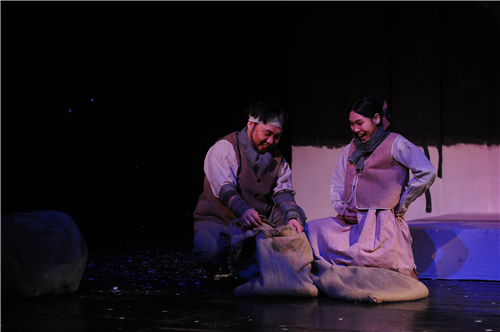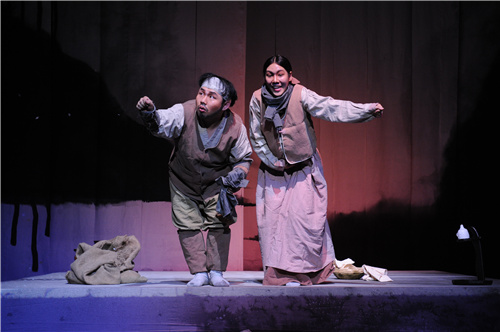
Director: You Hyun June
Institution: Chungwoon University, Korea
Venue: North Theatre
Time: 9:30-10:30, May 23, 2014
Event: The 1st World Theatre Education Convention with 3rd Asian Theatre Schools Festival

Director’s Notes
As working the play Shoo-oo Shoo once upon a Time, I have thought how many stories in this world would be and how much the stories of our lives in a way might be forgotten.
The stories are like a folk tale handed down from mouth to mouth and also like a rumour floated around place to place; however, they certainly reflect someone's life of a time period such as pain, sorrow, resentment, etc. whether they are nonfiction or not. Therefore, the stories are meaningful and valuable although they contain trivial matters.
I wish you have a chance to shed new light on our lives in the stories forgotten and do not miss hidden pain in them through this performance.

Synopsis
Set in a small Korean farming village, the play is about two antiheroes fighting a losing battle against dire poverty, relentless nature, and bureaucratic tyranny. As the play begins, Wife is waiting for her husband who's been over to his landowner's place to borrow seed to sow in the spring. He comes home and is concerned about his wife, who is in her last month of pregnancy, not being able to eat well. Wife is worried about the future of the baby to be born into their poverty-stricken family. Yet they are both glad that Husband has managed to get some seed. Husband is uneasy about a gang of bandits who robbed the government granary on the previous day. Much relieved by such irony, they start dreaming about how wonderful it will be to have their own baby. Simply being together with the baby will be such a wonderful thing for this young couple. They are not likely, however, to see even such a small dream come true. What with those bandits swarming all over and the bad harvest they just had, whatever they dream will remain only a pipe dream. The first act of the play thus shows us a seemingly ordinary and uneventful day in the life of a young couple in a poor village.
The first act depicts life as it has been for a long time in the past of this archetypal Korean couple. There have always been bandits swarming over the mountains. More often than not, there have been bad harvests, with a few exceptions in particular years. Bureaucratic tyranny has existed as far back as they can remember.
Act Two shows us the same setting as Act One. It is spring. Although winter is over, Husband and Wife are in the same miserable situation as in Act One. Added to their family is an infant boy who is doomed to share the misery and poverty of his parents' lives. To begin with, the baby is getting hardly any milk, since his mother doesn't have enough to eat.
Village Woman enters. It is she who introduces the story of a winged horse and a superbaby. She relates to Wife a rumour about a winged horse haunting the mountain near their village. According to a legendary story, a winged horse portends the birth nearby of a baby with supernatural powers. The legend says that he has scales all over his body and wings under his armpits. The baby is also able to walk as soon as he is born. He is believed to have tremendous physical strength. He will grow up to be a figure who will save people from their misery.
Husband walks into the scene to report that the district government office has sent soldiers out all over the mountains to capture the winged horse and eventually to track down the superbaby. Soldiers search every house for children under ten who show even a slight sign of unusual physical strength. The people become even more wretched than before.
When Husband discovers in Act Three the superbaby is none other than his own child, he has no choice but to kill him. Husband smothers the baby by putting on top of him the two sacks of seed that he had meant to sow. In Act Four, Wife hangs herself from a roof beam.
This last act turns into a fantasy, when the baby who had been killed enters the stage alive, riding the winged horse. He puts a bundle of flowers on his mother's dead body, and she comes back to life. At the end of the play, all three ride the winged horse up to Heaven, throwing flowers down on the people watching their ascent.
Running Time: 60minutes

